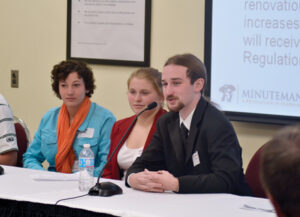

Ann Needle
By Ann Needle
With a major building project proposal in the works, Minuteman Regional Vocational High School hosted a legislative breakfast last Tuesday, accenting support of a senate bill that would increase funding for school building projects. Minuteman Superintendent Dr. Edward Bouquillon also took the opportunity to discuss a proposal for changes to their current regional membership agreement with area towns.
The Minuteman session was attended by about 10 state legislators, including Sen. Jamie Eldridge (D-Acton) and some of the bill’s co-sponsors. Last Thursday, a hearing was held at the State House for Senate Bill 228, calling for a 10% to 20% increase in state aide for regional school construction projects.
Minuteman Superintendent Dr. Edward Bouquillon termed the breakfast “an exchange about what our challenges are going forward, especially for our facility.” At a time when Minuteman works to train students for careers not yet invented, and retrain workers for changing career demands, he told the approximately 60 audience members at the session, “The key issue is getting this building project through.” Bill Sponsor Sen. Ken Donnelly (D-Arlington) agreed, stressing, “We especially need to train them for those middle-source jobs.”
After years of planning, Minuteman has several preliminary design options in hand for renovating what many say is an outdated facility. Depending on the construction option selected, project costs could run from $41 million for site repairs, to $112 million for a new building. According to Bouquillon, the pending legislative bill would require the state to add another 20% to the project’s estimated 40% reimbursement rate pledged by the MA School Building Authority.
Also key to this funding could be changing the current regional agreement among Minuteman’s 16-member cities and towns. The agreement governs items such as how much member and non-member towns pay in tuition per pupil, how that tuition is used, and voting rights for towns inside and out of Minuteman’s network.
The proposed, new agreement would eliminate the requirement for a unanimous vote from all 16 member communities for some items, Bouquillon said. He asserted that this voting rule has hindered not only the building project — with a struggle to get all Minuteman members to agree to it — but also has kept down the number of students, with the school running at less than 65% capacity.
“Towns don’t want to join [Minuteman], because they say you need a unanimous vote for everything, and towns with a few students get the same vote as towns with 170,” Bouquillon maintained. Also, with almost half the students coming from non-Minuteman members, “You can’t ask communities to support students that are out of district.”
Another reason Bouquillon offered for low student attendance was, “When Minuteman was built in the ’70s, we had a very different demographic.” He pointed to Arlington, which has always been one of the Minuteman towns with the most students; it is no longer the blue-collar town Minuteman was built to cater to 40 years ago. “We expected to have a lot more of our students going to the school. That didn’t happen.”
The new agreement also would call for non-members to contribute to the high school’s capital costs, such as those for the building project. Currently, the approximately $19,000 that non-member districts pay yearly per pupil attending Minuteman only can be applied to operating expenses. Minuteman estimated about 46% of students come from outside its member towns.
Student and Community Support
A panel of seven students, including two from Stow, offered its insights into the need for a new school.
Sophomore Michaela Ganimian of Stow mentioned that her specialty of Environmental Science calls on students to work outside about once a week. Students then need to haul specimens and equipment to and from the Environmental classrooms, “And we’re on the third floor of the building. In the new building, we would be on the first.”
David Howe, a Stow senior, echoed the need for updates. With the school struggling to fit 21st century careers into its 20th century equipment, Howe remarked, “This building was not designed for some of these shops. The greenhouse needs real walls. We love our school, but this building is getting old.”
Speaking to Minuteman’s contribution to local communities, MA Deputy Fire Marshal Peter Ostroskey described how the high school successfully built a single-family home on the grounds of the MA State Firefighters Academy a few years ago, to help train recruits in search and rescue operations. Though the estimated cost was $100,000, Ostroskey credited Minuteman with bringing the 12,000-sq.-ft., Cape-style house in at $40,000. “If Minuteman can save our communities money like that, it works for me,” he commented.
As Senate Bill 228 makes its way through the legislature, Bouquillon said he will travel to member communities in the next few months, meeting with selectmen and other officials in explaining the need to change the regional agreement. He said the school is looking to have the proposed new agreement on town meeting warrants in the spring.